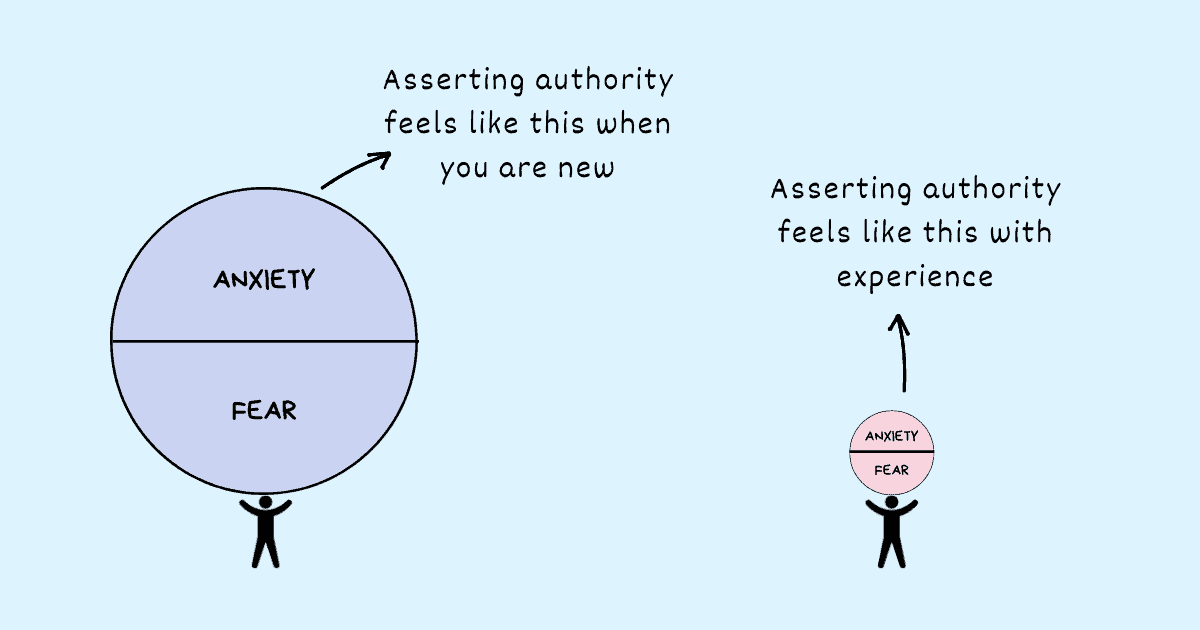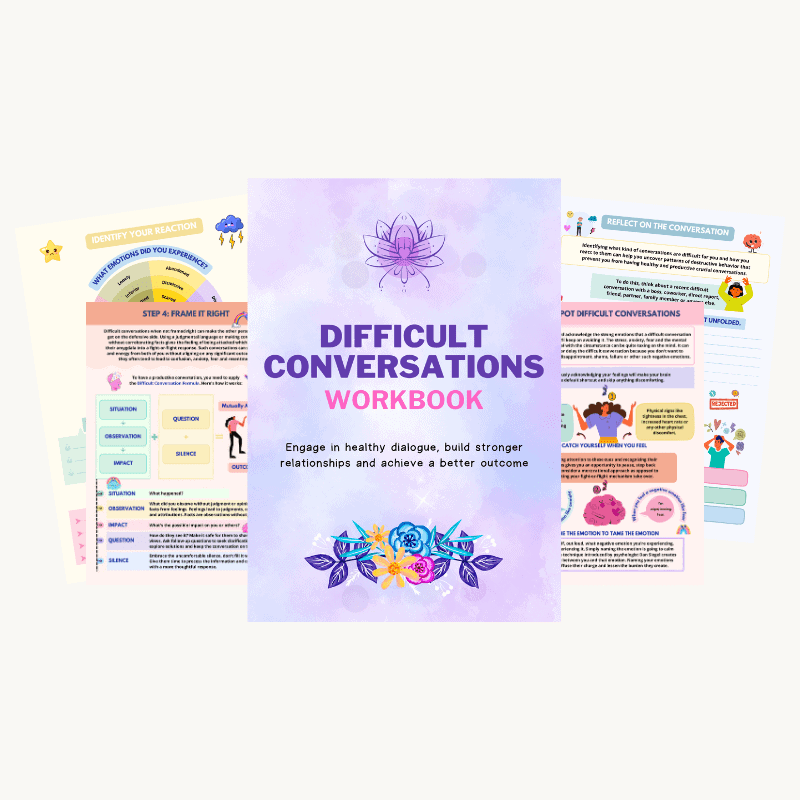How to Assert Authority as a Young Manager

Some discomfort is natural if you have recently moved from an individual contributor to a manager position. What further compounds this discomfort is if you have elder people or those who are more experienced reporting to you.
Your concerns—how can I assign tasks to my team, how can I raise concerns, how can I make suggestions, how can I point out mistakes, how can I make my team commit and stick to deadlines—are all valid. You want to do it right and not be misjudged or perceived as someone who’s unnecessarily exerting their authority as a manager.
Your two goals—being likable and achieving business objectives—may often seem to conflict.
- You want to come across as someone who’s nice to them, but how can you do it when they keep making mistakes.
- You want to stay on top of information but fear overdoing it and coming across as a micromanager.
- You want to hold people accountable but worry that they might feel offended and take it the wrong way.
Letting your discomfort get in the way of your decisions, holding yourself back from giving your ideas and suggestions, hesitating to set direction and guide your team or delaying feedback with the worry how it might land with the other person not only makes you ineffective as a manager, it also hurts your team’s productivity and performance.
Your biggest problem is this—you assume that you have to choose between candor and kindness or as Kerry Patterson puts it in Crucial Conversations “between telling the truth and keeping a friend.”
Leaning more towards kindness prevents you from speaking your truth while being direct and blunt without a hint of care turns into arrogance. To assert authority as a young manager, the magic is in the balance.
Practices to assert authority as a young manager
Care personally, challenge directly
Kim Scott, author Radical Candor identified two dimensions which when paired together can help you tremendously as a young manager.
The first dimension is care personally—it’s about showing genuine care for your people as a human being.
The second dimension is challenge directly—it involves telling people when their work isn’t good enough, holding the bar high and expecting nothing but excellence.
It may appear that challenging directly conflicts with care personally. It does not. Rather, challenging directly is often the best way to show that you care as a manager. Showing that you care makes them more accepting of your criticism—it turns into a roadmap for improvement.
To challenge directly, instead of performance goals—which are directed towards a specific outcome and require them to prove their competence—set learning goals—which makes them care more about what they are learning and how they are improving.
Shifting their time and energy from proving their competence to building skills and abilities will automatically inspire them to do better. They’ll be motivated to put their best foot forward. And if they do fail, the disappointment from not doing well will only fuel their motivation to work harder, try a different strategy or ask for help. Learning goals will lead to a growth mindset—shift in thinking from limited intelligence to unlimited potential.
As a young manager, don’t choose between caring personally and challenging directly. Do both.
Don’t command and control, inspire
Young managers often get authority wrong. They assume their role is to give orders, make decisions, avoid mistakes and use their power to do whatever it takes to achieve outcomes.
Outcomes are important, but they can be achieved without command and control style. Instead of dictating how something must be done, give your team the necessary context and clarity, let them own the how. As Julie Zhuo says in The Making of a Manager “the best outcomes come from inspiring people to action, not telling them what to do.”
Don’t butt in every small decision. It shows insecurity and lack of trust. Coach, mentor, inspire and educate your team to make their own decisions. Empowering your team in this way not only leads to more respect for you, it also leads to better outcomes in the long-run.
Mistakes are inevitable. Don’t try to avoid them. Rather, use them as learning lessons to inspire your team to do better in the future.
Irrespective of how tempted you’re to do your team’s work, don’t. Doing the work yourself just because you fear communicating and setting the right expectations limits your team’s growth and the collective outcomes you can achieve. Step out of your comfort zone, face your fears, identify the person on the team who’s best suited to do the job or who needs this opportunity in their career. Give them your trust and support. You’ll be amazed to see how a little trust and support goes a long way in enabling them to embrace these challenges.
As goes the popular saying from Maya Angelou “People will forget what you said, people will forget what you did, but people will never forget how you made them feel.” Leave your people feeling inspired, not dominated and diminished.
Practice more curiosity, pass less judgments
When things don’t work out or when others don’t meet your expectations, instead of passing judgment, express curiosity.
For example:
Instead of: How can you miss the deadline?
Ask: Was there a gap in your understanding of the timeline to deliver this product? What got in your way of meeting it?
Instead of: Your code quality is really bad.
Ask: Do you know the code quality metrics that we follow in this team? Do you need help in learning how to write better code?
Instead of: You’re late for the meeting. Why can’t you come on time?
Ask: You got late for this meeting. Is everything all right?
Judgment puts the other person on the defensive. They feel attacked and respond in kind. Expressing curiosity opens them to engage and discuss. It shifts their attention from problem to solution. No longer thinking about how it reflects on them makes it easier for them to move on and move forward.
As Douglas Stone says in Difficult Conversations “You can’t move the conversation in a more positive direction until the other person feels heard and understood. And they won’t feel heard and understood until you’ve listened. When the other person becomes highly emotional, listen and acknowledge. When they say their version of the story is the only version that makes sense, paraphrase what you’re hearing and ask them some questions about why they think this. If they level accusations against you, before defending yourself, try to understand their view. Whenever you feel overwhelmed or unsure how to proceed, remember that it is always a good time to listen.”
As a young manager, the ability to show curiosity, listen intently and work together in a way that shows you’re on their side builds trust—a key foundation to get anything done.
Ask for support
When you’re just starting out in your role as a new manager, it’s hard not to make mistakes. You haven’t mastered the skills required to do well in your role. You haven’t had the opportunity to differentiate between a good and a bad decision. You don’t know what kind of communication style works with your team. You don’t yet fully understand your team’s strengths and aspirations. You haven’t worked your way through a major conflict. You haven’t experienced the intensity of a stakeholder’s meeting.
I can go on and on about what’s yet to be done. But let’s not focus on that. Because here’s the key thing: it all gets better with experience. Trying to hide your mistakes or working extra hard to avoid them will only lead to anxiety and frustration. It will also derail you from the goal of “do well and achieve success” to “cover-up and limit exposure.”
Instead of trying to be perfect, acknowledge you don’t know everything yet. Show vulnerability to master the behaviors and attitudes required to do well in your role. As Brène Brown puts it in Daring Greatly “Vulnerability is not weakness, and the uncertainty, risk, and emotional exposure we face every day are not optional. Our only choice is a question of engagement. Our willingness to own and engage with our vulnerability determines the depth of our courage and the clarity of our purpose; the level to which we protect ourselves from being vulnerable is a measure of our fear and disconnection.”
And the most important thing, while you’re on this journey, is to remember this: you can’t do it alone. Speak to your team about your challenges, ask for their feedback on how you’re doing, and show your intention to learn and do better. Your team will appreciate your authenticity. They’ll see that you’re trying.
Asserting authority as a young manager isn’t about getting people to do things the way you want. It’s about aligning on common goals, defining success, providing context and clarity, empowering them to make decisions, and giving them the space needed to shine.
Summary
- When you’re just starting out as a manager, fearing how others perceive your communication can be the biggest impediment to your ability to do your job effectively.
- You may try to avoid conflicts, find it hard to share constructive criticism, or hold yourself back from setting expectations.
- Some discomfort is part of your job. It comes with the role and the responsibility of being a manager. However, you need to learn to not let it get in the way of your decisions or how you communicate with your team.
- Show genuine care for your people, but don’t let it get in the way of holding them to high standards. You can be kind and still expect excellence.
- Instead of being the person who holds the team together and gets things done, be the person who empowers the team to do equally well when you’re not around.
- Don’t subject your team to your opinions, assumptions, and judgments. They are easy to pass and destroy your team’s morale. Instead, show curiosity to understand by asking questions and listening intently.
- Acknowledge that you have a long way to go. Seek support from people around you.






























